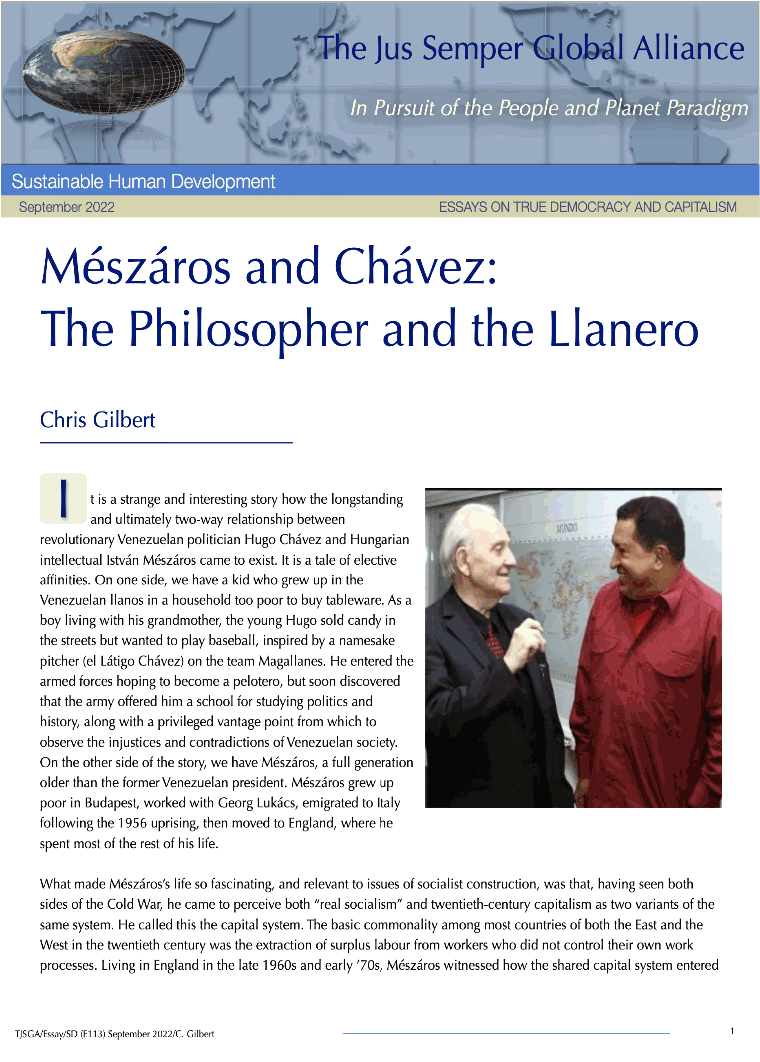Mészáros and Chávez: The Philosopher and the Llanero
Chris Gilbert On the other side of the story, we have Mészáros, a full generation older than the former Venezuelan president. Mészáros grew up poor in Budapest, worked with Georg Lukács, emigrated to Italy following the 1956 uprising, then moved to England, where he spent most of the rest of his life. What made Mészáros’s life so fascinating, and relevant to issues of socialist construction, was that, having seen both sides of the Cold War, he came to perceive both “real socialism” and twentieth-century capitalism as two variants of the same system. He called this the capital system. The basic commonality among most countries of both the East and the West in the twentieth century was the extraction of surplus labour from workers who did not control their own work processes. Living in England in the late 1960s and early ’70s, Mészáros witnessed how the shared capital system entered a profound crisis.1 On the one hand, the countries of the West implemented neoliberal reforms inspired by the theories of Frances Hayek and Milton Friedman. These newly coined neoliberal policies allowed the West to kick the can down the street, riding out a crisis it could not definitively resolve. On the other hand, in the Eastern Bloc countries, the same structural crisis would be the preamble to the implosion of post-revolutionary systems that, because of their hybrid nature (they continued to extract surplus labour from workers but could not apply the same economic pressures as the strictly speaking capitalist system), found themselves unable to ride out the crisis with even the limited success of Ronald Reagan and Margaret Thatcher’s governments. This was still the age of “three worlds,” and from the privileged position of living and working in two of them, Mészáros developed his key ideas. The most important of these was that capital was essentially a metabolic system, dependent on a vertical division of labour over which it has command. Faced with the system’s crisis, what was needed was not less socialism but more! Self-managed production and the existence of substantive democracy at all levels of this alternative society were the key features of what Mészáros called the communal system. He saw it as the only viable, sustainable alternative to the capital system. The affinities with Chávez’s ideas and policies should be clear enough from this brief introduction alone. As is well-known, Chávez had a firm belief in substantive democracy as the centrepiece and mainspring of socialism; he wagered on community councils and other forms of self-organisation to emancipate the Venezuelan people (“Only the people will liberate the people,” Chávez said on numerous occasions); and he opted in the end for a communal system to build socialism (echoing Mészáros’s claim that not a “less socialist” but “more socialist” socialism was needed in the twenty-first century). All these features make for a striking isomorphism between the two figures, despite their widely divergent backgrounds and upbringings. As it turned out, Chávez would mobilise his followers and significant resources on a hypothesis that was in great measure based on the Hungarian philosopher’s approach to the socialist transition.
For a full read of this brief, click here or on the picture to download the pdf file.
|

- © The Jus Semper Global Alliance
| Home |  | Resources |  | Democracy Best Practices |  | Mészáros and Chávez: The Philosopher and the Llaner |


